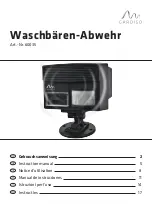
15
Transportation
The communication module has been tested to and
complies with the United Nations transportation
regulations of UN/DOT ST/SG/AC.10/11 (Rev. 5)
Section 38.3 testing requirements T1-T5, T7.
Disposal / Collect Separately
The communication module rechargeable battery
should be completely discharged prior to disposal
and/or the terminals should be taped or capped to
prevent short circuit.
Non-European Union residents must dispose of or
recycle this product in accordance with the local laws
or regulations that apply.
Collect Separately
This product contains electrical and electronic
components that may contain materials, which if
disposed of with general waste, could be damaging to
the environment.
In accordance with Directive 2002/96/EC Waste
Electrical and Electronic Equipment, residents of
the European Union must follow specific disposal or
recycling instructions for this product. Contact your
local distributor, or visit the following web site for
specific instructions:
http://www.smiths-medical.com/recycle/index.html
WARNING:
There are potential health hazards
associated with improper disposal of batteries and
other electronics. Dispose of used batteries and
other used accessories in an environmentally safe
manner, and according to any regulations that may
apply.
REACH Information
Under the European Regulation for Registration,
Evaluation, Authorization and Restriction of
Chemicals (“REACH Regulation EC No. 1907/2006”)
companies are required to disclose to customers if a
product contains any of the substances identified on
the Candidate List of Substances for Authorization
(also known as the Substances of Very High Concern
(SVHC)) at a concentration above 0.10% by weight.
Smiths Medical’s declarations regarding SVHCs in
products can be found at: www.smiths-medical.com/
environment
Part 15 Certification
and RSS standard(s)
This device complies with part 15 of the FCC Rules
and Industry Canada license-exempt RSS standard(s)
.
Operation is subject to the following two conditions:
(1) this device may not cause harmful interference, and
(2) this device must accept any interference received,
including interference that may cause undesired
operation.
Cleaning and Disinfecting the
Communication Module
For optimal efficiency, it is recommended best practice
to clean first and then disinfect. All disinfectants
require pre-cleaning, except for disinfectant cleaners
that are tested to disinfect in the presence of 5% of
organic matter.
CAUTION:
Do not immerse the communication
module in cleaning fluid or water. Do not allow
solution to soak into the communication module.
Moisture buildup inside the communication
module may damage the device. Clean
and disinfect the exposed surfaces of the
communication module when installed in the
pump.
















































